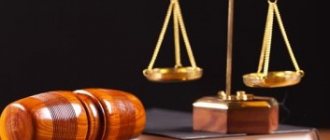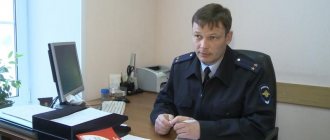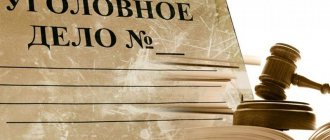Powers of the prosecutor when exercising supervision at the stage of preliminary investigation
December 14, 2017
Supervision over the legality of the activities of preliminary investigation bodies is carried out regardless of their departmental affiliation. Prosecutor's supervision has a procedural form and is expressed in monitoring the accurate and uniform execution of laws by the bodies of inquiry and preliminary investigation.
If a violation of the law is detected by the body of inquiry (the inquirer), the law obliges the prosecutor to personally intervene in the investigation, cancel the illegal decision and correct the mistake. An appeal against the instructions of the supervising prosecutor to a higher prosecutor during an inquiry does not suspend their execution.
Supervision of the preliminary investigation in relation to the inquiry is limited. If during an inquiry the prosecutor has the right to identify and cancel any illegal decisions of the inquiry body and the interrogating officer, then during a preliminary investigation he does not have such powers. When supervising the preliminary investigation, the prosecutor does not have the right to give instructions to the investigator, direct the course of the investigation, cancel the illegal decisions of the investigator, or give consent to terminate the criminal case.
The powers of the prosecutor (Article 37 of the Code of Criminal Procedure) when exercising supervision at the stage of preliminary investigation are exercised in the forms of: a) instructions to the investigator on the direction of the investigation, on the selection, change or cancellation of a preventive measure, the qualification of a crime, the performance of certain investigative actions, the search for persons who have committed crimes, other procedural actions; b) giving consent to the investigator to initiate a petition before the court to select, cancel or change a preventive measure or to perform another procedural action that is permitted on the basis of a court decision; c) cancellation of illegal and unfounded decisions of the investigator, lower-ranking prosecutor; d) removal of the investigator from the preliminary investigation if he committed significant violations of the law; e) allowing challenges, self-recusal of the investigator; f) forwarding a criminal case based on jurisdiction from one investigative body to another; g) seizure of the criminal case from any preliminary investigation body and transfer it to an investigator of the Investigative Committee of Russia; h) approval of the investigator’s decision to terminate criminal proceedings, indictment, indictment; i) returning the criminal case to the inquirer or investigator with his written instructions on conducting an additional investigation, changing the scope of the charge, qualifying the actions of the accused, restating the indictment or indictment; j) demands from the bodies of inquiry and investigative bodies to eliminate violations of federal legislation committed during the inquiry or preliminary investigation.
Carrying out supervision over the legality of pre-trial proceedings, the prosecutor particularly focuses on the decisions of the investigator on the conduct of investigative actions that limit the constitutional morals of citizens, the application of preventive measures related to the isolation of the suspect from society, and on the completion of the preliminary investigation.
After the completion of the preliminary investigation and the receipt of the criminal case by the prosecutor's office for approval of the indictment (act), the prosecutor focuses on the completeness, comprehensiveness, and objectivity of the investigation. If you disagree with the completeness of the preliminary investigation, the scope of the charges, or the qualifications of the actions of the accused, the prosecutor has the right, with his written instructions, to return the criminal case for additional investigation. The prosecutor's decision to return the criminal case may be appealed to a higher prosecutor.
To implement the supervisory powers of the prosecutor in pre-trial proceedings, the legislation provides for acts that are a form of expression of these powers.
The normative basis for acts of prosecutorial supervision is contained in Art. 23-25, 28 of the Federal Law of January 17, 1992 No. 2202-I “On the Prosecutor’s Office of the Russian Federation” and Part 2 of Article 37 of the Code of Criminal Procedure.
Acts of prosecutorial response in criminal proceedings on the merits of the powers being exercised require their written expression. They are always individual, addressed to officials of the bodies of inquiry or preliminary investigation. The most important requirement for the content of acts of prosecutorial supervision is the legal justification and the precise formulation of his proposals, consistent with the powers of the prosecutor.
Prosecutor's supervision of pre-trial proceedings and management of the criminal prosecution of persons suspected of committing crimes during the preliminary investigation are united by a common purpose. The prosecutor, while supervising the accurate and uniform implementation of laws by the investigative and inquiry bodies, simultaneously exercises his powers to direct the criminal prosecution.
Prepared by the Department for Supervision of
Procedural and Operational Investigative Activities of the Regional Prosecutor's Office
Return to list
On the powers of the prosecutor's office to control investigative bodies
De facto proof occurs at the pre-trial stage. It is a common opinion that the prosecutor and lawyer (defender) are representatives of two opposite parties in criminal proceedings, and adversarial criminal proceedings by their nature do not imply any effective interaction between them.
Complete or partial refusals of prosecutors from charges in judicial practice are rare due to the staged criminal process adopted in our country, in which proof de facto occurs primarily in the pre-trial stage. The judicial stage often comes down to, so to speak, a public verification of the evidence collected by the investigation and the classification of the act given by the investigation, while providing the defense with the opportunity to challenge basically an already decided case.
Hence the judicial statistics on acquittals, the critics of which do not take into account the obvious fact that if before the judge the case was handled by three more equally qualified lawyers - the investigator, the head of the investigative body and the prosecutor - and if the latter acted in good faith, then the likelihood of the judge having an excellent As a general rule, the prosecution's view of a criminal case cannot be high.
Moreover, at the judicial stage, the prosecutor is bound by the very fact of approving the indictment, which presupposes a conscientious examination of the criminal case by him before it is sent to court.
Once, by the will of fate, while defending a judge, I well remembered his phrase that the case could be effectively resolved positively for the defense only during the investigation. Having worked in the judicial system for many years, he knew this well.
Finally, who among the lawyers did not hear a simple question from a representative of the state prosecution during the trial: why did you not present evidence for the defense during the investigation? It just seems formal and seemingly meaningless. The meaning in it is enormous: the prosecutor draws our attention to the above structure of the process, hinting that we, the defense, brought him problems, since if he had studied this evidence before transferring the case to court, he would have returned the case for additional investigation, perhaps , without the prospect of bringing it to court, but at the judicial stage he is already bound by the fact that he approved the indictment.
Under the slogan of increasing the independence of the investigator Do we today, at the stage of preliminary investigation, have a sufficiently authorized procedural subject capable of resolving the dispute between the defense and the investigator? Of course have. Only this is not the prosecutor, but the head of the investigative body - the one with whom the investigator directly coordinates his main actions and decisions in the case. And lawyers know that sometimes preparing a decision on a complaint in accordance with Art. 124 of the Code of Criminal Procedure of the Russian Federation, the heads of the investigative bodies entrust the investigator, whose actions are appealed by the applicant. In my practice, quite recently there was a case when, right up to the deputy chairman of the Investigative Committee, all the heads of the investigative body, responding to a complaint filed in accordance with Art. 124 of the Code of Criminal Procedure of the Russian Federation, indicated that at the pre-trial stage it is not necessary to terminate criminal prosecution for episodes with expired statutes of limitations: this may affect the completeness and comprehensiveness of the investigation of the case. What else can I add here? This example is not unique.
Let me remind you that at one time, when the Investigative Committee of the Russian Federation was being formed, investigation officials achieved a significant reduction in the powers of the prosecutor to supervise the investigation of criminal cases. And this idea was promoted under the slogan of increasing the independence of the investigator.
Years earlier, some authors called for the revival of the institution of forensic investigators, saying that the ideal would be to have an investigator who would conscientiously and independently investigate criminal cases, guided by the law and his own conscience. But nothing of the kind happened due to the fact that the tasks of the preliminary investigation are solved not by individual investigators, but by the investigative apparatus, which forms the procedural and other investigative practices, including in specific criminal cases. The investigator in this apparatus is an ordinary employee working under the full control of the head of the investigative body. That is why talk about the formation of an independent and effective investigator is inappropriate.
There is no one to appeal to. In such a system of relations, the practical relevance is not the degree of control and supervision on the part of an individual prosecutor over an individual investigator in a specific case - the investigator will always be controlled, if not by the prosecutor, then by his supervisor, but by the question of the powers of the prosecutor's office to control the investigative bodies. And the powers of the prosecutor to supervise the investigation of the case depend on the solution of this general, and primary, issue.
Now, when the powers of the prosecutor in the sphere of supervision over the investigation are extremely reduced, the defense at the stage of preliminary investigation simply does not have a properly authorized procedural subject to whom it could effectively appeal with its arguments, with the exception of the stage provided for in Chapter. 31 of the Code of Criminal Procedure of the Russian Federation, where minimum terms are established. And this despite the well-known position of the Supreme Court of the Russian Federation on the need to reduce (under the guise of specifying) the scope of application of Art. 125 of the Code of Criminal Procedure of the Russian Federation and existing judicial statistics on cases of judicial control in the pre-trial stage of criminal proceedings (30% of complaints are considered, 5% are satisfied by the courts). Moreover, the courts always appeal to Art. 38 of the Code of Criminal Procedure of the Russian Federation that the investigator independently directs the progress of the investigation in a criminal case, being the only and independent subject of the proceedings in the case at the pre-trial stage.
I am competing not so much with the prosecutor, but with the judge. I would like to remind you that the Code of Criminal Procedure of the Russian Federation, with its detailed rules and stages of the process, is rooted in the Soviet Code of Criminal Procedure. And, probably, not everyone remembers how serious the demands were placed on investigators in Soviet times - this is known to those lawyers who managed to work as investigators in those already distant years. The judicial stage in the ideology of that time, not least of all, had the task of publicly proving and showing the guilt of the accused. Hence, the Code of Criminal Procedure of the RSFSR, instead of the principle of adversarial parties, contained the principle of completeness, comprehensiveness and objectivity of the investigation. Hence, the Code of Criminal Procedure of the RSFSR provided for the powers of the prosecutor to supervise the investigation, incomparable with the existing ones, and the preliminary investigation procedure was maximally detailed in the rules.
And then an adversarial process happened with a radical change in the basic, general provisions of procedural law. However, the true essence of the adversarial process presupposes that the main procedure of proof is carried out in court. In our case, the case goes to court with all the collected and procedurally documented evidence and its detailed assessment in the indictment in favor of the prosecution’s version. The judge, guided by the rules of Ch. 33 of the Code of Criminal Procedure of the Russian Federation, must study all this even before scheduling a court hearing in the case.
This situation is fundamentally different from the one when the parties present evidence to the judge directly during the judicial investigation, and can give their assessment of the evidence, and only those admitted by the court, only in the debate between the parties.
The defense side is not deprived of the opportunity, at the end of the investigation, to make its statement with an assessment of the evidence, which the judge will also read before the start of the hearing, but this opportunity is rarely realized, and an indictment is always drawn up.
When defending myself in court, I sometimes catch myself thinking that I am competing not so much with the prosecutor, but with the judge, who, even before the start of the trial, formed his attitude to the question of the defendant’s guilt. Sometimes you hear from fellow lawyers: we challenged the judge because he is clearly convinced of the defendant’s guilt. But if you look at it: what’s surprising here? This is the rule of our Code of Criminal Procedure. If you have already studied the case before the hearing with the participation of the parties, your task will only be to hide your already formed conviction from the participants in the hearing or begin to fight this conviction. But you can’t escape your conviction - it is formed independently of you when you first study the case materials. The results of your study are influenced by the interpretation of the materials given in the indictment.
The rules of our trial provide the defense with the opportunity not to convince, but to convince the court of the defendant’s guilt. And these are different things. And this is another reason to strengthen the role of the prosecutor in supervising the investigation at the pre-trial stage.




